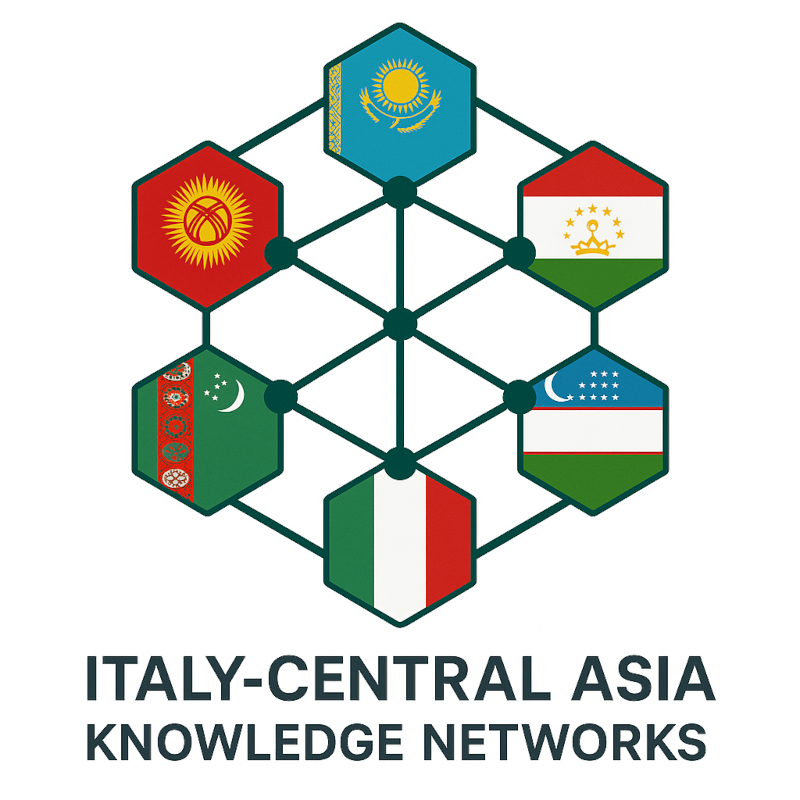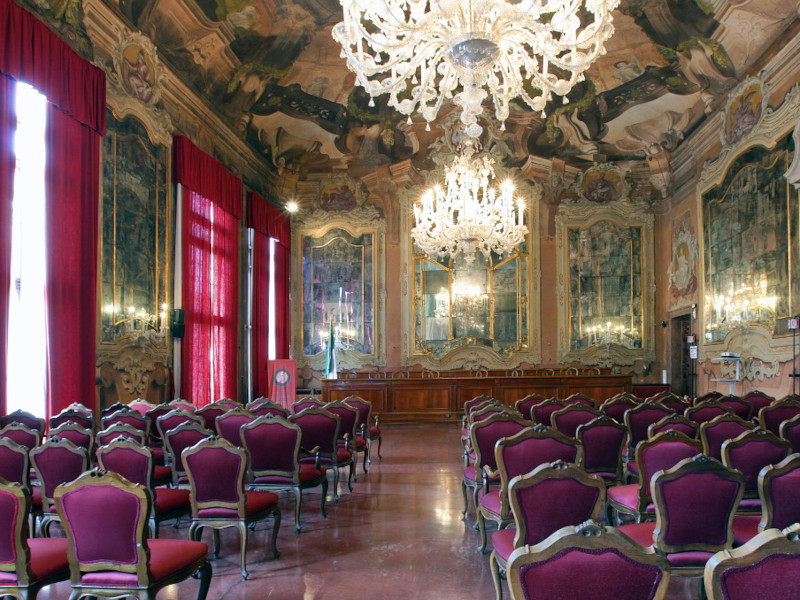KNIT-CA
Knowledge Network-building between Italy and Central Asia
Project
High-level contacts between Italy and Central Asia have become increasingly frequent and intense, reflecting the growing geostrategic importance of the region in a rapidly changing global landscape. This strengthened engagement is testified by the Ministerial Conference between Italy and the Central Asian countries in the ‘1+5’ format, launched in 2019 and reaching its fourth edition in 2025. A core aim of this Ministerial Conference – as reaffirmed during its third edition in Rome – is to foster initiatives that promote and expand the network of relations between the parties involved.
Aligned with this objective, and more broadly with the aim of ensuring continuity in dialogue and exchange, the KNIT-CA project seeks to involve leading Italian research institutions – both academic and non-academic – in the creation of Knowledge Networks (KNs). These networks are primarily designed to:
facilitate deeper exchanges and joint reflections between Italian institutions and their Central Asian counterparts;
provide concrete, bottom-up support for the development of intergovernmental relations.
Driven by academic initiative, the KNs are nonetheless to be considered as inclusive as possible. Involving the business community in the development of KNs is critically important with a view to widen and strengthen the exchanges, ensure concrete deliverables, and help providing sustainability to the project over the mid- to long-term.
The goal of these Knowledge Networks is to promote the dissemination and application of knowledge, foster collaboration and innovation, and encourage joint research and information exchange between Italy and Central Asia across areas of shared interest. Through these collaborations, participating countries can develop sustainable solutions to common challenges and drive innovation in key sectors.
In this perspective, the project focuses on six thematic Knowledge Networks that reflect the most relevant areas of dialogue between Italy and Central Asia, as identified since the first Ministerial Conference held in Rome in December 2019. These sectors are:
- Energy Transition;
- Water Resources;
- Health;
- Sustainable Agriculture;
- Connectivity;
- Higher Education and Advanced Training.
Through KNIT-CA, Italy and Central Asia aim to strengthen the foundations for multilateral and bilateral cooperation and partnership, paving the way for a future of shared development and innovation.
The project is run by the Department of Asian and North African Studies, Ca' Foscari University of Venice, with the support of the Ministry of Foreign Affairs and International Cooperation.
Research
The promotion of joint research and publications constitutes a fundamental axis of the KNIT-CA project, directly supporting the creation of sustainable academic partnerships and the advancement of scientific knowledge. Collaborative research initiatives and co-authored publications are essential drivers of scientific and academic progress, fostering the exchange of ideas, methodologies, and best practices among scholars from different institutions, countries, and disciplinary backgrounds. These activities contribute to the mutual enrichment of knowledge, the development of innovative approaches, and the formulation of interdisciplinary solutions to common challenges. Joint research activities also play a strategic role in informing and supporting intergovernmental dialogue. By providing robust analytical tools, evidence-based insights, and concrete policy recommendations, academic research aims at contributing to the formulation of effective public policies and to the advancement of sustainable development objectives shared by Italy and the Central Asian countries.
In its initial phase, a series of sectoral studies has been launched in collaboration with Italian partner universities. These studies aim to provide an initial needs assessment and to identify national best practices that can inform the design of future cooperation activities. Additionally, they are intended to offer strategic recommendations for shaping collaborative research programmes and defining policy-relevant knowledge outputs that support both academic advancement and intergovernmental dialogue.
In line with the action priorities of the Italy-Central Asia Ministerial Conference, the initial sectoral studies have focused on the following areas:
- Energy Transition (Department of Materials Science, University of Milan-Bicocca);
- Sustainable Agriculture (Department of Agriculture and Forest Sciences, University of Tuscia);
- Sustainable Management of Water Resources (Department of History and Cultures, University of Bologna);
- Infrastructural Connectivity (Department of Political Sciences, Sapienza University of Rome);
- Higher Education and Advanced Training (Department of Asian and North African Studies, Ca’ Foscari University of Venice).
Events
The organization and promotion of joint events is a central pillar of the KNIT-CA project, serving as a strategic mechanism to foster the creation of Knowledge Networks and to promote dialogue, collaboration, and innovation across sectors and disciplines. Joint events provide a unique and dynamic platform for engaging a wide range of stakeholders – including universities, research centers, think tanks, public institutions, and business communities – enabling the exchange of ideas, best practices, and experiences on topics of high relevance to the intergovernmental agenda. These initiatives facilitate not only the dissemination of expertise and innovative solutions but also play a vital role as a bottom-up mechanism, offering fresh perspectives and practical inputs to ongoing intergovernmental dialogue and cooperation.
By convening actors from diverse backgrounds and fostering the convergence of multiple viewpoints, joint events contribute to the formulation of more informed, inclusive, and forward-looking policies. They serve as a catalyst for the development of collaborative projects, the strengthening of institutional partnerships, and the identification of shared solutions to common challenges. KNIT-CA supports the establishment of structured and sustainable channels of dialogue that reinforce multilateral cooperation and contribute to shaping a shared vision for future collaboration between Italy and the Central Asian countries.
Events organized under the KNIT-CA patronage
- 24/06/2025 - “Common Horizons: A Shared Vision for Green Energy Transition”
Tashkent, National University of Uzbekistan - 19/06/2025 - “Of Bridges and Nexuses: Italy-Central Asia Cooperation towards a sustainable future. Multidisciplinary perspectives on water, connectivity, and sustainable development”
Venice, Ca’ Foscari University of Venice - 17/03/2025 - “Creation of knowledge in Central Asia: Innovation, Sustainability and Academic cooperation”
Tashkent, Turin Polytechnic University in Tashkent
Education and training
Building bridges through ‘soft connectivity’ is a key aim of KNIT-CA project. In today’s globalized environment, soft connectivity – the strengthening of human, cultural, and educational ties – has become a key enabler of long-term cooperation and mutual understanding between nations. While hard infrastructure connects places, soft connectivity connects people, fostering dialogue, trust, and shared values. Within this framework, higher education and advanced training play a fundamental role in cultivating the next generation of leaders, innovators, and change-makers.
In an increasingly interconnected world, joint education programmes play a crucial role in fostering targeted collaboration, cultural exchange, and academic excellence. By integrating diverse teaching methods and cross-cultural interactions, joint education programmes not only prepare individuals to navigate a rapidly evolving global landscape, but also promote academic cooperation and innovation, facilitating knowledge transfer, interdisciplinary research, and the sharing of best practices. Moreover, they contribute to deepen and widen ties between the C5+1 countries, reinforcing the idea that education is a powerful tool for building bridges between cultures.
Summer School on Energy Transition (Tashkent, June 22-28, 2025)
The Summer School is organized by GEM-SILKWAY, an international project involving more than 17 partner institutions all over the world, in cooperation with University Milano-Bicocca, Cà Foscari University of Venice, the National University of Tashkent and the Technical University of Tashkent, under the patronage of KNIT-CA project. The aim of the Summer School is to adopt a cross-cultural and interdisciplinary perspective in analyzing concepts like sustainability and human development. It will focus on energy efficiency, particularly in the context of recent changes in Central Asia and reflects the latest innovations and developments.
Topics covered:
- World and Central Asia energy scenario, the new trends in energy production (renewable and conventional);
- Green energy development trends: overview and opportunities in Central Asia;
- Artificial Intelligence in green energy management;
- Energy efficiency in building renovation.
Summer School on Technical-Experiential Programme on Water Resource Management and Irrigation Innovations (Viterbo, June 30 to July 4, 2025)
The Summer School is organized by the Department of Agriculture and Forest Sciences - University of Tuscia, in partnership with Ca’ Foscari University of Venice and with key players in the agri-environmental sector, including TORO Irrigation, ARSIAL, and the Maccarese Agricultural Company. Its overall aim is to equip participants with both theoretical knowledge and practical skills to address current challenges in agricultural water management, particularly in the context of climate change and sustainability.
The programme combines theoretical seminars, field visits, and hands-on sessions on hydrological modeling tools. Structured over five days, the programme offers a multidisciplinary and practical approach to key topics in sustainable agriculture, including:
- Water resource management and innovative irrigation systems;
- Hydrological and hydraulic modeling;
- Strategies for managing water stress in crops;
- Technological innovation and sensor-based irrigation systems;
- IoT applications in agriculture; (f) Digital and precision farming for sustainability.
Crossroads Mentorship Programme
As a central component of the KNIT-CA project, the Mentorship Programme is conceived as a strategic initiative to enhance soft connectivity by promoting academic excellence and cross-cultural dialogue. It also contributes to deepening and broadening the ties between Italy and the Central Asian countries within the C5+1 framework, affirming the conviction that education and human capital development are essential foundations for sustainable cooperation. The Mentorship Programme is specifically designed to connect scholars from Central Asian institutions (the mentees) with distinguished academics and researchers affiliated with Italian universities and research centers (the mentors).
The programme offers consultation, guidance, and academic supervision on research projects, specific scholarly activities, or topics aligned with the broader research interests of the mentees. The programme is implemented through a flexible model based on virtual meetings, allowing mentors and mentees to engage in open and collaborative discussions tailored to the specific needs and goals of the mentees. The mentorship relationship focuses on concrete academic and professional objectives, including Enhanced Research Capacity, Increased Access to Funding Opportunities, Career Development, and Promotion of Best Practices.






